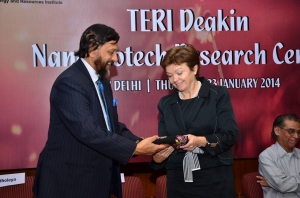Nanobiotech investment headlines new wave of India agreements
Research news
The TERI-Deakin Nanobiotechnology Research Centre (TD-NBC) is set for a $10 million expansion, resulting in a state-of-the-art facility in Gual Pahari near New Delhi.
During her recent visit to India, Deakin Vice-Chancellor Professor Jane den Hollander said that the expansion would considerably enhance the Centre’s ability to focus on global issues such as food security for growing populations in changing climates, sustainable agricultural practices and environmental sustainability.
The new field of nanobiotechnology has opened up a spectacular new world of possibilities in biomedical, agricultural, energy and other fields. A crucial focus of the TD-NBC is its emphasis on clean, non-toxic and environment friendly nanoparticle synthesis, including the use of micro-organisms such as bacteria and fungi in the biosynthesis of metal nanoparticles. This holds immense potential for addressing some of the world’s most pressing problems.
Jointly funded by The Energy and Resources Institute (TERI) of India and Deakin, the TD-NBC is currently home to 19 full-time research scientists, project associates and technicians, and 13 PhD students. The new facility - expected to be operational by 2015 - will have the capacity to accommodate an envisaged 100-plus researchers, including 50 PhD students.
Further cementing the Deakin-TERI relationship, Professor den Hollander announced that TERI will soon establish a presence at Deakin’s Waurn Ponds campus.
The Deakin-TERI announcements were among a host of new agreements signed and sealed in India during the Vice-Chancellor’s visit. Three MOUs with tertiary institutions, a defence institute partnership, and a new Vice-Chancellor’s Indian scholarship program were also announced. The Deputy Vice-Chancellor (Global Engagement) Professor Gary Smith and Institute for Frontier Materials Director, Professor Peter Hodgson, accompanied the Vice-Chancellor.
Since becoming the first university in the world to set up an office in India, in 1996, Deakin’s involvement in India has skyrocketed. Today, Indian students make up 11 per cent of our international student population, including almost 150 PhD students.
Professor den Hollander said she was delighted to be launching the Deakin Vice-Chancellor India Scholarship program, with five undergraduate and five post-graduate scholarships initially available to support talented students in a Deakin course in Australia.
The first recipients of these scholarships were three students from two leading Mumbai colleges, the Kishinchand Chellaram College of Arts, Commerce and Science, and the Hassaram Rijhumal College of Commerce and Economics. The recipients were: Akash Punjabi, Year Three, Bachelor of Commerce at KC College; Aatish Jaisinghani, Year Twelve at HR College; and Aakash Mehta, Year Three, Bachelor of Banking and Insurance at HR College.
The other new agreements include a partnership with the Defence Institute of Advanced Technology (DIAT) that will result in collaborative projects in the areas of materials and functional textiles, and an MOU with the Indian Institute of Technology Madras in Chennai, which is renowned for its research in metallurgy and manufacturing. Both of these agreements were signed as part of the Deakin India Research Initiative (DIRI).
MOUs with Amity University and Ansal University in New Delhi will also lead to new collaborative opportunities in high end research, teaching and learning, including opportunities for staff and student exchange.
Share this story
 TERI Director General Dr RK Pachauri and Deakin Vice-Chancellor Professor Jane den Hollander.
TERI Director General Dr RK Pachauri and Deakin Vice-Chancellor Professor Jane den Hollander.
